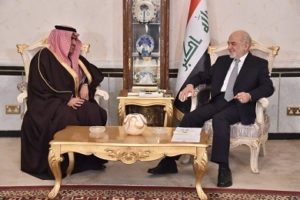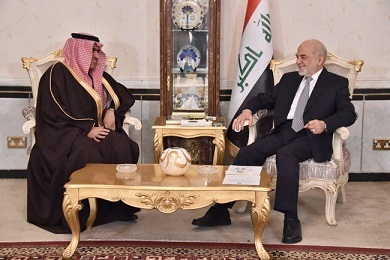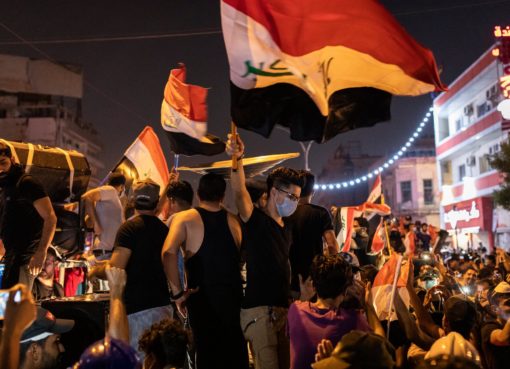
Saudi Arabia appointed an Ambassador to Iraq in December 2015, ending its 25 years of diplomatic boycott that followed the 1990 Iraqi invasion of Kuwait. Although the cause of the boycott, Saddam Hussein’s regime, was removed in 2003 at the hands of its American allies, Saudi Arabia resisted relentless efforts by the U.S. to restore its diplomatic relations with post-Saddam Iraqi governments, protesting the strong relations between the new Iraqi leadership and Iran, Saudi Arabia’s rival in the geopolitical and sectarian battle to control the region.
The Saudis occasionally made this point very clear whenever they voiced their frustration with U.S. policies in the region. On 11 September 2011, Prince Turki al-Faisal, a former director of Saudi Arabia’s Intelligence Service and a former Saudi Ambassador to the U.S., wrote in the New York times: “Saudi leaders would be forced by domestic and regional pressures to adopt a far more independent and assertive foreign policy… Saudi Arabia would pursue…policies at odds with those of the United States, including opposing the government of Prime Minister Nuri al-Maliki in Iraq and refusing to open an embassy there despite American pressure to do so.” Indeed, this became Saudi Arabia’s policy for the next four years.
When the Saudis finally accepted to open the embassy in Baghdad, the policy became even more counterproductive than before. The Ambassador they sent to Baghdad was Thamer al-Sabhan, a former military attaché at the Saudi Embassy in Beirut (Lebanon) and a career security police officer. It was reported that his work in Lebanon “was instrumental in arming the Lebanese military as part of a French-Saudi deal worth an estimated $3 billion. Saudi Arabia has been backing Lebanon’s army against the powerful Hezbollah, which is supported by Tehran.” Analysts viewed his appointment as a mission to play a similar role to counter Iranian influence in Iraq. Ambassador al-Sabhan’s conduct in Iraq has not proven the skeptics to be unreasonably pessimistic about the nature of his mandate. Instead of observing diplomatic protocols and limiting his work to what ambassadors do, namely representing the interests of his country in Iraq and communicating his concerns through diplomatic means, the Saudi Ambassador antagonized the Iraqi Ministry of Foreign Affairs and the Iraqi people by a series of press statements and political meetings with various Iraqi factional leaders.
Ambassador al-Sabhan also used his Twitter account to release very provocative statements about internal Iraqi affairs and harshly criticized Iraqi Shia political leaders, often accusing them to be loyal servants of Iran. In an early tweet, written on 3 March 2016, he described certain Shia leaders as follows: “they betray God, their nations, and peoples, and serve the evil state (Iran) with all their power against their brothers and kin, but they become angry when we confront them and expose their sectarianism and criminality.” Reading the followers’ responses to each tweet leaves no doubt about whom he means by each one, not to mention the hate speech and religious intolerance they generate.
The last provocation was the Ambassador’s claim that certain Shia Popular Mobilization Units (PMUs) were plotting to assassinate him, a charge that was emphatically denied by the Iraqi Ministry of Foreign Affairs, which issued a press release emphasizing “that what has been spread across media outlets of a plot to assassinate the Saudi Ambassador in Baghdad is baseless and …that all diplomatic missions to Iraq are being adequately protected by security forces, which have ensured, via Baghdad Operations Command, the safety of all those missions. However, none of them, including the Saudi embassy, have informed the ministry of any potential security threat targeting them.” Other than a comment after the fact by one PMU spokesperson, no credible evidence has been presented to substantiate the ambassador’s claims.
These assassination claims by Ambassador al-Sabhan came right after he lashed out against current Iraqi Vice President, and former Prime Minister, Nuri al-Maliki in response to the latter’s statements about Saudi support of terrorism in Iraq. On 14 August 2016, without naming al-Maliki, Ambassador al-Sabhan said the following about him: “What can be expected from someone who fought against Iraq, stood on the side of Iran, and during his term of office Iraq lost 70% of its land to his ISIS allies?”
The Iraqi Ministry of Foreign Affairs, despite Minister Ibrahim al-Jafari’s great interest in strong relations with Saudi, could not ignore the popular demand for a decisive action against such deviation from diplomatic norms. Ambassador al-Sabhan was summoned by the Iraqi Ministry of Foreign Affairs, more than once, to be made aware of Iraqi Government’s disapproval of his conduct, but he continued more aggressively in the same direction. Finally, on 29 August 2016, Iraq formally asked Saudi Arabia to replace Ambassador al-Sabhan, considering his presence “an obstacle to the development of relations between Iraq and Saudi Arabia.” In his first response to this last Iraqi decision, Ambassador al-Sabhan continued to attribute all Iraqi government’s actions as a result of assertive Iranian pressures.
The final outcome of this latest impasse will depend on whether it was caused by the indiscretions of a novice Saudi ambassador or the strategic direction of Saudi Arabia’s foreign policy in Iraq. If the latter assumption is true, the replacement of Ambassador al-Sabhan is not going to resolve the Iraq’s grievances about aggressive Saudi meddling in its internal affairs. The replacement, in this case, will likely be another military or intelligence personality rather that a professional diplomat capable of handling the delicate relations between the two countries. Part of this problem must be blamed on the Iraqi leadership, particularly the Ministry of Foreign Affairs. Iraqi leaders were so desperate to secure the opening a Saudi Embassy in Baghdad that they did not address the qualifications of the diplomat who was going to lead it, nor did they reject the weak credentials of Ambassador al-Sabhan when his appointment caused controversy from the moment his appointment was announced. Now it will be very hard for Iraq to object if the Saudis don’t act in good faith and appoint an ambassador like Mr. al-Sabhan. The Saudis might also find the Iraqi request as an opportune moment to reduce their representation in Iraq, if not closing the Embassy. After all, their diplomatic presence in Iraq did not originate in a Saudi desire to acknowledge Iraq’s government, but mostly a result of relentless U.S. pressure and Iraqi lobbying.
(*) Abbas Kadhim is a senior fellow at the Foreign Policy Institute, SAIS, Johns Hopkins University. He can be followed on Twitter @DrAbbasKadhim
Source: The Huffington Post, 1 September, 2016








Comment here